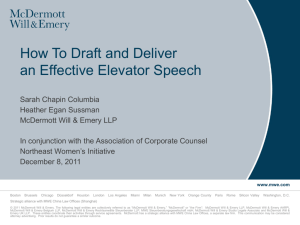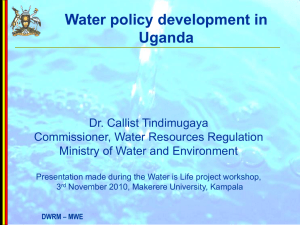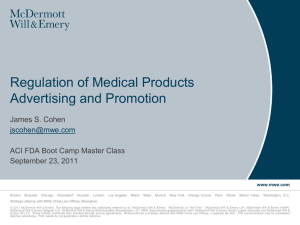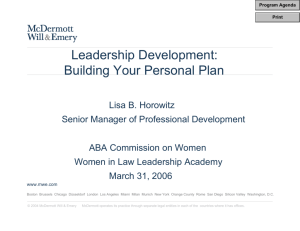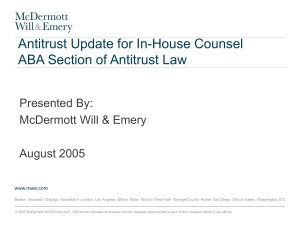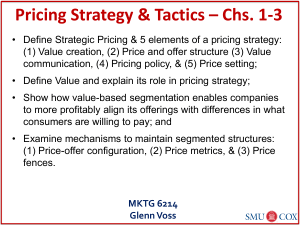Transfer Pricing And Dispute Resolution: - IFA-UK
advertisement
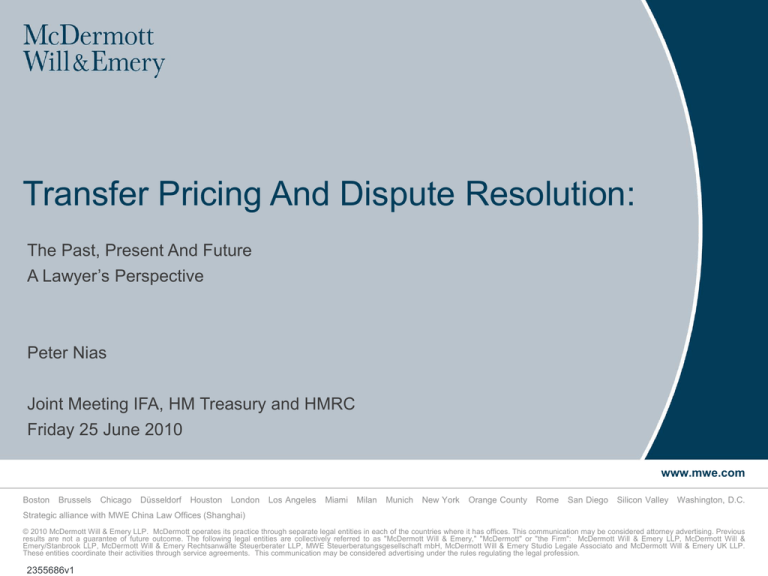
Transfer Pricing And Dispute Resolution: The Past, Present And Future A Lawyer’s Perspective Peter Nias Joint Meeting IFA, HM Treasury and HMRC Friday 25 June 2010 www.mwe.com Boston Brussels Chicago Düsseldorf Houston London Los Angeles Miami Milan Munich New York Orange County Rome San Diego Silicon Valley Washington, D.C. Strategic alliance with MWE China Law Offices (Shanghai) © 2010 McDermott Will & Emery LLP. McDermott operates its practice through separate legal entities in each of the countries where it has offices. This communication may be considered attorney advertising. Previous results are not a guarantee of future outcome. The following legal entities are collectively referred to as "McDermott Will & Emery," "McDermott" or "the Firm": McDermott Will & Emery LLP, McDermott Will & Emery/Stanbrook LLP, McDermott Will & Emery Rechtsanwälte Steuerberater LLP, MWE Steuerberatungsgesellschaft mbH, McDermott Will & Emery Studio Legale Associato and McDermott Will & Emery UK LLP. These entities coordinate their activities through service agreements. This communication may be considered advertising under the rules regulating the legal profession. 2355686v1 TRANSFER PRICING – THE PAST Old Regime (prior to 1998) - sc 770 Taxes Act 1988 • Direction (No penalties) • Accounting: FRS 8 “material” related party transactions New Regime – Sch 28AA Taxes Act 1988 – Accounting Periods ending on/after 1st July 1999 Adopts OECD Model (Article 9) and Guidelines (as at 30th April 1998) Wide ambit: wording obscure and complex Documentation: production and retention requirements HMRC: Guidance on documentation and penalties – Measured – Recognised potential of new regime APA Regime www.mwe.com TRANSFER PRICING - AMBIT “provision…has been made or imposed as between any two persons…by means of a transaction or series of transactions” Sc 147(1)(a) Taxation (International and Other Provisions) Act 2010 “provision…” – the overall situation brought about by the transaction or series of transactions; not provision as in term, or condition in a contract “as between…” – demonstrates that the parties to the transaction or series of transactions do not need to be those between whom provision is made or imposed “transaction or series of transactions” – arrangements, understandings, mutual practices whether or not enforceable – series: widely defined Discussions on draft legislation: HMRC/Parliamentary Counsel/Law Society DSG decision: no surprise www.mwe.com EXAMPLE: UK Sub Borrows to make minority investment in French Sub at request of US Parent Guarantee US Parent 100% 75% UK Sub Loan 25% Investment French Sub Issues: www.mwe.com Is bank interest deductible? Even where no parent guarantee? Should UK Sub charge fee to US Parent for making investment? Should investment be re-characterised as loan? 3rd Party UK Bank DSG CASE warranty Customers Dixons Finance reinsurance/ insurance commission commission Cornhill/ASL (agent) premium Goods Dixons DSG Retail Note: Point of Sale Advantage www.mwe.com admin/ repairs premium/fee Dixons Mastercare Dixons DISL TRANSFER PRICING – THE PRESENT 10 years experience Multinational Planning – Functional analysis – Deconstruct supply Impact – Distribution/sales agency – Manufacturing – IP ownership The “undistributed middle” HMRC developments – Risk assessment (Tax Bulletin 60, August 2002) – Transferring risk (International Manual, 465030) HMRC Cross-Directorate TP Group – TP specialists – Structured governance procedure – Focus/targeted approach www.mwe.com TRANSER PRICING – THE PRESENT Revenue needs – Income for authorities – Cost for multinationals Planning and audit challenges – Sophisticated – Detailed – Aggressive? – Potential for litigation HMRC litigation and settlement strategy – Non-confrontational/collaborative resolutions without dispute (para 4) – “Avoidance” cases? www.mwe.com TP – THE PRESENT Litigation position – increasing trend? Up to 2008: 4 cases (2 procedural) Beecham Group Plc v CIR (1992) Glaxo Group Ltd and others v CIR (1995) Ametalco Ltd v CIR (1996) Waterloo (2002) Since 2008 DSG case (2009) Astra Zeneca case (2010) www.mwe.com TRANSFER PRICING – THE FUTURE OECD Developments Permanent Establishment Issues – Profit attribution – Existence – SPF (significant people function) Restructuring Paper (Sept 2008) – restructuring not an asset in itself requiring compensation – no “industrial intangible” – non recognition of transactions: dealt with by pricing adjustment – acceptable to be tax motivated provided non tax business purpose TP Guidelines, Proposed Revision of Chapters 1-111 (Sept 2009) – more flexible/pragmatic approach to transactional profit methods – all methods recognised – Emergence of residual profit split; no longer last resort International Disputes Mechanisms – Competent authority procedure www.mwe.com TRANSFER PRICING – THE FUTURE Old TP studies too superficial/mechanical More detailed TP analysis expected by HMRC – Fact/Law/Documentation SPF impact on functional analysis: who has control over risk “Capacity to make decisions to take on the risk (to put capital at risk) and … whether and how to manage the risk, internally or using an external provider” OECD Restructuring Paper, para 30 DSG case implications - technical arguments - document content - negotiation process - robustness of pricing method - importance of “bargaining power” Increasing need for certainty in tax treatment – APA/ATCA – Provision/reserve in accounts www.mwe.com TRANSFER PRICING – POST ACQUISITION RESTRUCTURING US INC UK TARGET CO IP Licence Royalty EXISTING OPERATING SUBS IP Licence Royalty NON-UK IP HOLDING AND MANAGEMENT CO UK/NON UK SUBSIDIARIES R&D Contract IP Transfers Sale/Licence Lump Sum Payment www.mwe.com TRANSFER PRICING – POST ACQUISITION RESTRUCTURING Principal issues: – IP assets transferred – TCGA or Sch 29 (part 8 CTA 209) – Purpose behind transactions – Accountancy treatment of licence back • Finance lease under UK GAAP? Or Sch 29? – Sch 28AA (part 4 TIOPA 2010) • Arms length transaction – Valuation principles – sale and licence back Other issues: – SSE Relief – Business Hive Up – Consolidation/streaming of losses www.mwe.com TRANSFER PRICING – THE FUTURE Real time negotiation; pre return/filing agreement APA/ATCAs HMRC powers (and discretion) “collection and management of revenue”, sc 5 CRCA 2005 Improving dispute resolution; HMRC Review (July 2009) – Litigation expensive in terms of time and legal fees – More time on fact-finding – Focus on working relationships with customers/agents – New HMRC supervisory review function? – Consider ADR techniques EU Arbitration Convention 90/463/EEC – 15 years; 2 cases MAP – arbitration provisions in Treaties www.mwe.com TRANSFER PRICING – THE FUTURE Use of mediation – Facilitative – steering process, improving communication – Evaluative – offering views on merits and outcomes Issues – Joint appointment – costs shared – Legal basis is contractual – Both sides must engage – Mediation can build sense of trust and co-operation – Facts (as well as law) – Confidential – Timing Suitable for Transfer Pricing – Not binary; Not just issues of law Process and Governance Issues www.mwe.com CONCLUDING REMARKS Early Discussion “Cards face up on table”; two way process Transfer pricing disputes - no right answer - compromise Advisers – Help/Hindrance? Role for lawyers Transfer Pricing: – Inherently factual, but – Legal analysis important Legal professional privilege – both sides Judges …. are lawyers! www.mwe.com
